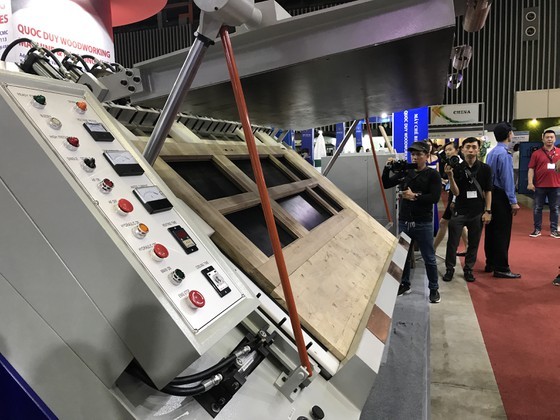SGGP News– Despite the impacts of the Covid-19 pandemic, in the first four months of this year, wood exports still achieved US$3.2 billion, an increase of 6 percent over the same period last year.

Vietnam’s wood industry needs to invest in modern processing technology to improve the product quality. (Photo: SGGP)This is the result of the cooperation between associations and enterprises in switching to online trading and seeking new markets.
By the end of April this year, the Handicraft and Wood Industry Association of Ho Chi Minh City (Hawa) had 7 percent of all wood processing enterprises ceased operations completely, 51 percent of them reduced production and partially halted production activities, and 45 percent of workers temporarily stopped working. However, in the first four months of this year, the total export value of timber and forest products of Hawa members reached more than $1 billion, up more than 10 percent over the same period. Of which, wooden product exports exceeded $698,000, up 5.8 percent over the same period.
According to figures by the Department of Industry and Trade of Binh Dinh Province, in the first four months of this year, the provincial wood industry’s exports reached around $188 million, up 13 percent year-on-year. Of which, an increase in the export turnover mainly came from wood chips, wood pellets, and wooden products. Mr. Le Minh Thien, Chairman of the Forest Product Association of Binh Dinh Province, said that the reason for an increase in the export turnover was mainly due to a sudden increase in wood chip exports to China. As enterprises had made wooden products in the previous year and focused on exporting them right after the Lunar New Year so wooden products still managed to keep the export value.
On the other hand, the fact that Vietnam has controlled the Covid-19 effectively amid the context that its rivals in the ASEAN, the EU, and the US have had to suspend their operations has also helped Vietnamese enterprises to get more orders. Besides, enterprises should be recognized for their efforts to proactively seek unseasonal orders in the Australian market, leapfrog orders in the EU and the US markets, negotiate mutual support measures among importers, exporters, manufacturers, and domestic traders in the matters of storage, preservation, payment, raw materials, and supplies.
Although export turnover shows positive signs at this time, the pandemic remains complicated and unpredictable, especially at main markets, including the EU, the US, and Japan.
However, according to Mr. Do Xuan Lap, Chairman of the Association of Vietnam Timber and Forest Product (Vifores), this year, the growth of the wood industry can still post nearly a two-digit number as thanks to good control on the Covid-19, Vietnam has become an attractive country for many wood processing investors with sales of billions of US dollars to build factories. From another perspective, many Vietnamese enterprises are zealously shifting the production of core products or products with large quantities to adapt to the market. The production of the second quarter might decline but this is normal as the number of orders usually drops by 30 percent in summer.
Currently, the policy to live with the pandemic in most countries will affect greatly, changing the consumer trend, and the production and distribution methods of wooden products of enterprises. Mr. Nguyen Chanh Phuong, Vice Chairman of Hawa, analyzed that amid these conditions, to protect their health, many people will stay at home, the pace of life will slow down or they will change the way of working and the office will be smaller. Therefore, there will be changes in the design of furniture.
During the Covid-19 pandemic, many wooden products of Vietnam could not be exported for not having finished the final products. Most of the products lacked accessories such as straps and paints. Meanwhile, these accessories are mainly imported from China.
Not only accessories, but Vietnam’s wood industry also lacks raw materials. Although the country grows a large number of many types of forest trees, including rubber, eucalyptus, acacia, and manglietia conifer, it is facing a serious shortage of planks. Moreover, many plywood manufacturers have not met export standards. Although wood exports account for a high proportion, Vietnam still does not have an international exhibition center large enough to display products.
To achieve the target, it is clear that the wood industry must expand its scale by building industrial clusters for wood manufacturing. Currently, the two provinces of Binh Dinh and Nghe An have reserved land funds to develop industrial clusters for the wood manufacturing, while developing supporting industries such as mechanics, wood processing equipment, chemicals, paints, plywood, artificial boards, and processing chains for forestry development.
According to Mr. Le Minh Thien, the processing industry of wood and export forest products needs to ensure the quality of tree varieties, expand the area of large certified specialized timber plantation, ensure sustainable legal sources of raw materials, and find high-quality seeds suitable with the soil to provide raw materials for domestic production. Along with that, it needs to promote wood product processing and manufacturing, connect supporting industries and develop the chains of wood and forest products, help enterprises to enhance competitiveness and expand a larger market share in the main export markets, ensuring diversification of quality and plentiful products to meet consumer needs.
Amid the context that Vietnam is encouraging to invite foreign investors, the Vifores proposed the Government and provinces to have policies to control and avoid accepting relocated factories with outdated technology and need to set a minimum scale of $5-10 million. Do not encourage the production of products that are being imposed anti-dumping duties to have strategies to develop the wood industry quickly and solidly for Vietnamese enterprises.



